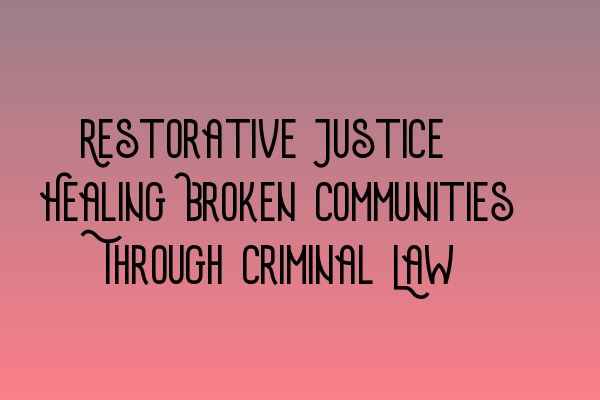Restorative Justice: Healing Broken Communities Through Criminal Law

Restorative Justice is an innovative approach in the field of criminal law that aims to repair the harm caused by crime and rebuild relationships between victims, offenders, and the community. Unlike traditional criminal justice systems focused solely on punishment, restorative justice brings together all parties involved to address the root causes of crime and seek resolutions that promote healing and understanding.
Understanding Restorative Justice
Restorative justice recognizes that crime is not just an offense against the state, but also a violation of the rights and well-being of individuals and the community as a whole. It focuses on three main principles:
- Inclusion: All relevant parties, including victims, offenders, and community members, are actively involved in the process.
- Accountability: Offenders are held accountable for their actions and encouraged to take responsibility for repairing the harm caused.
- Reintegration: The ultimate goal is to reintegrate offenders back into the community in a way that promotes their rehabilitation and prevents further offenses.
Restorative justice emphasizes dialogue, empathy, and active participation. Through facilitated meetings, victims have the opportunity to express their feelings, ask questions, and seek answers directly from the offenders. Offenders, on the other hand, have the chance to understand the impact of their actions, make amends, and learn from their mistakes. This collaborative process not only empowers the victims but also helps offenders develop a sense of empathy and personal growth.
The Benefits of Restorative Justice
Restorative justice offers numerous advantages over traditional punitive approaches:
- Empowers victims by giving them a voice and addressing their needs for closure, restitution, and emotional healing.
- Promotes offender accountability and responsibility, leading to higher chances of successful rehabilitation and reduced recidivism rates.
- Rebuilds trust and fosters positive relationships within communities, promoting social cohesion and harmony.
- Reduces the burden on the criminal justice system by diverting cases that are more suitable for restorative justice processes.
Implementing Restorative Justice in the UK
Restorative justice practices have gained recognition and support in the UK legal system. The Criminal Justice Act 2003 introduced restorative justice provisions, allowing victims to participate in the criminal justice process and giving courts the power to defer sentencing for restorative justice interventions. These provisions opened new avenues for healing and resolution.
Today, there are various organizations and initiatives dedicated to promoting and facilitating restorative justice practices across the UK. These organizations provide training, support, and resources for legal professionals, victims, offenders, and communities interested in embracing this transformative approach to justice.
If you’re interested in learning more about restorative justice and its application in the UK legal system, check out our related articles:
- SQE 1 Practice Exam Questions
- SQE 1 Practice Mocks FLK1 FLK2
- SQE 2 Preparation Courses
- SQE 1 Preparation Courses
- SRA SQE Exam Dates
Restorative justice has the potential to transform our criminal justice system by focusing on healing, restoration, and the empowerment of individuals and communities. By embracing this approach, we can work towards building a more compassionate, inclusive, and resilient society for all.
